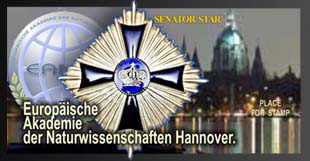 |
Европейская академия
|
| В начало | Энциклопедия ЕАЕН | |
Энциклопедия Европейской академии естественных наук |
||
 Fanhua Ma
Fanhua Ma
Prof.Dr. Fanhua Ma is currently associated with School of Vehicle and Mobility,Tsinghua University as Associate Professor with more than twenty years of experience in academics and research. He won Ph. D degree of internal combustion engine in Xi’an Jiaotong University in1997,and he was a visiting Professor of Aachen RWTH in 2006. His area of expertise includes combustion, emission and control of internal combustion engines, especially focuses on Hydrogen enriched compressed natural gas (HCNG) internal combustion engines. He has published more than one hundred and forty research papers in referred journals/conferences, and the total cited numbers of his 47 published SCI papers is more than three thousand time. As the first winner, he won the 1st Prize of Beijing Science and Technology Award in 2011: Fundamental Research on Combustion and Emission of Hydrogen Enriched Fuel Internal Combustion Engine. As the first winner, he won the 1st Prize of Beijing Science and Technology Award in 2021: Key Technologies and its Application of Middle and Heavy Duty Gas Fuel Internal Combustion Engine and Vehicles. As the first winner, he won the 1st Prize of Science and Technology Award of Chinese Machinery Industry Federation in 2020: Key Technologies and its Application of Middle and Heavy Duty Gas Fuel Internal Combustion Engine. He won the Outstanding Contribution Award of Chinese Society for Internal Combustion Engine in 2010. He won the 12th Five-Year Plan Machinery Industry Advanced Workers of Chinese Machinery Industry Federation in 2016. He had 10 patents.
He was responsible for six National Projects of Chinese Ministry of Science and Technology, and he was responsible for one project of National Scientific Foundation Committee. He is responsible for more than twenty projects funded by municipal government and enterprises. He is an editor of journal of sustainable Energy. He is member of International Codes and Standards of Hydrogen (ISO/TC 197). He is member of International Partnership of Hydrogen Energy Communication and Implementation Committee. He has appointed as deputy coordinator of UNDP-GEF fuel-cell bus commercialization demonstration project funded by Global Environment Funds, United Nation Development Program (UNDP) and Chinese Ministry of Science and Technology during (2003-2007), and total funds of the project was 32 millions US Dollars.
Main Acedamic Achievements
Dr. Fanhua Ma achieved a lot of original research results in combustion, emission and control of hydrogen enriched compressed natural gas (HCNG) internal combustion engines.
- Effect of different hydrogen fraction in HCNG fuel on combustion, emission and performance of HCNG internal combustion engines had been investigated for lean burn and stoichmetric engine fueled by compressed natural gas (CNG). The results indicate that with the increase of hydrogen fraction in HCNG fuel the lean burn limit of HCNG engine was extended, the brake thermal efficiency of HCNG engine was improved, the total unburned hydrocarbon (THC) and carbon oxide (CO) were decreased and nitric oxide ( NOx ) was increased.
- A turbulent entrainment combustion model of HCNG engine was developed, and a laminar burning speed formula for different hydrogen fraction in HCNG fuel was proposed. The developed combustion model of HCNG engine and HCNG fuel laminar burning speed formula were successfully applied in the simulation of HCNG engine combustion process and a lot of important results related were achieved.
- The research results indicate that 20% hydrogen fraction in HCNG fuel may result in best performance of HCNG engine’s power, brake thermal efficiency and emissions, and this results strongly support the establish of Chinese national standards of HCNG fuel for internal combustion engines.
- In case of different HCNG engine operation conditions the corresponding hydrogen fraction in HCNG fuel should be chosen in order to achieve best performance under the condition of full operation area of the HCNG engine. The hydrogen fraction in volume of HCNG fuel is 30%~50% in case of low load of HCNG engine, the hydrogen fraction in volume of HCNG fuel is 15%~30% in case of middle load of HCNG engine, and the hydrogen fraction in volume of HCNG fuel is 5%~15% in case of high load of HCNG engine in order to achieve best performance of the HCNG engine.
- An optimized approach and the calibration method of HCNG engine based on nervus network model and genetic algorithm were proposed in order to save the time and cost of HCNG engine research and development.
- An electric controlled HCNG engine had been successfully developed. The HCNG engine fuel consumption of ETC cycle was decreased by 7% compared with base CNG engine of Euro III, and emission may meet Euro V and EEV regulation under the condition of same power output. Four city buses were developed powered by HCNG engine and were successfully demonstrated in Beijing 2008 Olympics and Guizhou Province, and the city buses had been demonstrated more than 100 thousand kilometers. The first 1500 KW power plant of HCNG internal combustion engine in China was developed in 2020 and then was successfully demonstrated and commercialized.
- As deputy coordinator of UNDP-GEF fuel-cell bus commercialization demonstration project funded by Global Environment Funds, United Nation Development Program (UNDP) and Chinese Ministry of Science and Technology, Dr. Fanhua MA designed and built up the first hydrogen station in China for fuel cell vehicles in 2007, and he also was involved in the development of four types of fuel cell buses funded by four National Projects.
Prof. Huang Zhen, member of Chinese engineering Institute identified Dr. Fanhua Ma’s theoretical research and technology of HCNG engine reached the advanced level in the word.
| Энциклопедия ЕАЕН |